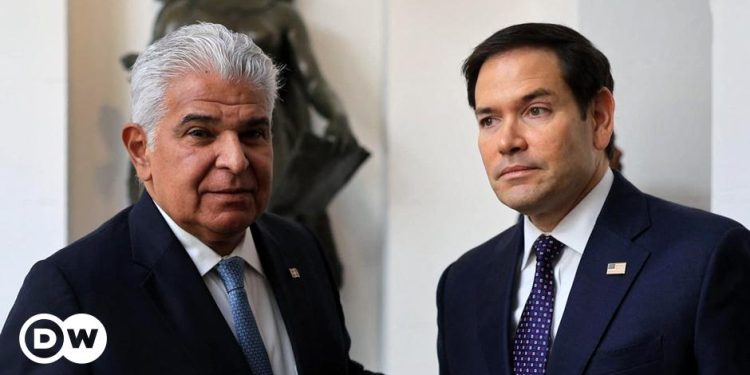US Secretary of State Marco Rubio met the president of Panama Jose Raul Mulino on Sunday, marking his first international trip as the country’s first diplomat in the middle of President Donald Trump’s attempt to recover control of the canal Panama.
Trump suggested that the growing influence of China in the region, especially thanks to its investment in Panama ports, presents a risk of national security.
He refused to eliminate military measures to take over the canal, which the United States presented to Panama in 1999.
“They have already proposed to do a lot,” said Trump on Friday, “but we think it is appropriate that we take it back”, adding that Panama had violated the agreements by allowing excessive Chinese involvement.
Panama says the canal is ours
Rubio shook hands with Foreign Minister Javier Martinez-Acha and put a thumb panel before heading for talks with Mulino.
After the meeting, the president of Panama said that he had discussed with Rubio the question of Chinese ports near the Panama Canal, as well as migration.
Mulino said that he would not renew the Panama-China Silk Road agreement, which could be terminated early. He said that the sovereignty of his country on the Panama canal was not to be discussed, the canal is exploited by Panama and will remain so.
However, he proposed technical discussions with the United States to respond to Trump’s concerns about Chinese influence in the channel and proposed to help repatriate certain migrants if the United States has paid for this.
Meanwhile, according to the spokesperson for the US State Department, Tammy Bruce, Rubio told Panama that China’s influence was “violation” of the canal treaty and that the status quo was unacceptable.
He also warned the country that without “immediate changes”, the United States would take “measures” necessary to protect its rights under the treaty.
Before the weekend, Mulino had firmly rejected any negotiations concerning the American control of the canal.
“I cannot negotiate, much less open a process of negotiations on the canal,” said Mulino on Thursday, saying that the question “is sealed”.
“The canal is that of Panama,” he said.
However, its administration launched an audit of CK Hutchison Holdings, based in Hong Kong, which operates ports on both sides of the canal.
Small but intense demonstrations broke out in Panama at the meeting, the police drawing tear gas. About 200 people walked in the city of Panama, transporting Panamanian flags and shouting “Marco Rubio outside Panama”, “Long Live National Sovereignty” and “One Territory, One Flag”.
Rubio on tour in Central America
Rubio, while minimizing the question of military intervention, told Siriusxm Radio in an interview before the trip that the Panama Canal is a “national interest” for the United States.
The Panama canal serves as a vital trade route, connecting the Atlantic and Pacific oceans and facilitating 40% of the circulation of American containers.
“We cannot allow any foreign power – in particular China – to hold this type of potential control over what they do,” said Rubio. “It just can’t continue.”
Rubio’s visit is part of a wider visit to Central America, which will also include Salvador, Costa Rica, Guatemala and the Dominican Republic.
Rubio, the son of Cuban immigrants, speaks Spanish fluently, helping her to conduct American diplomacy in the Latin America region.
SS, DH / WMR, WD (AP, AFP)


